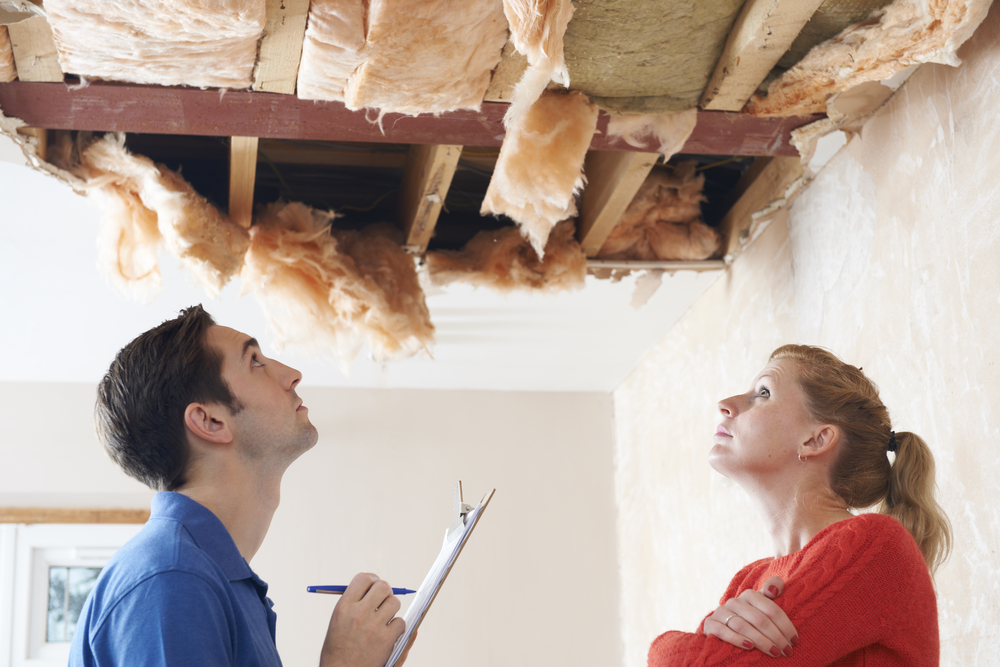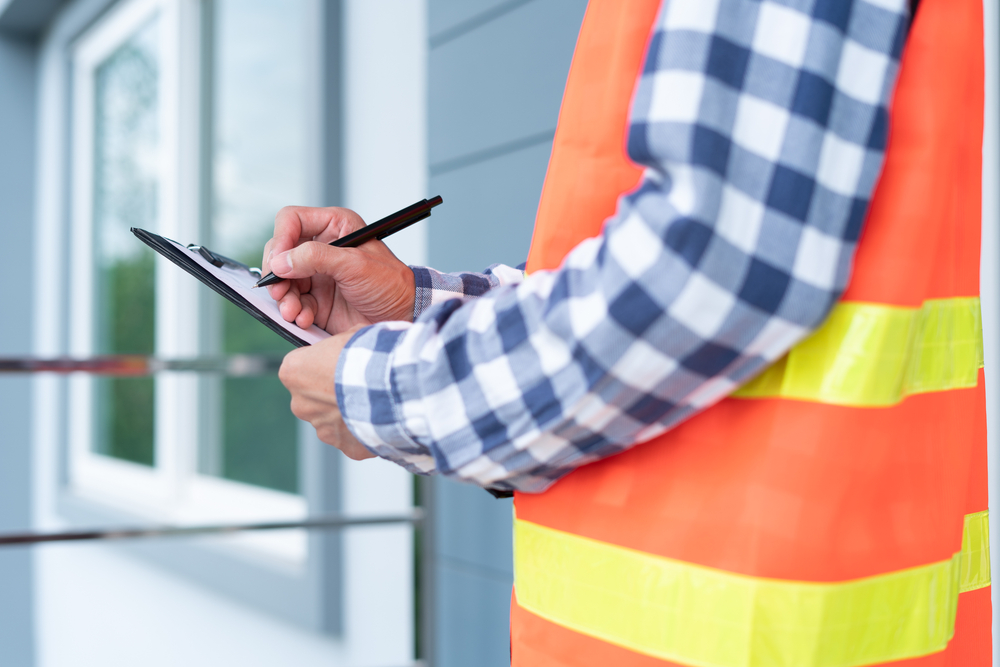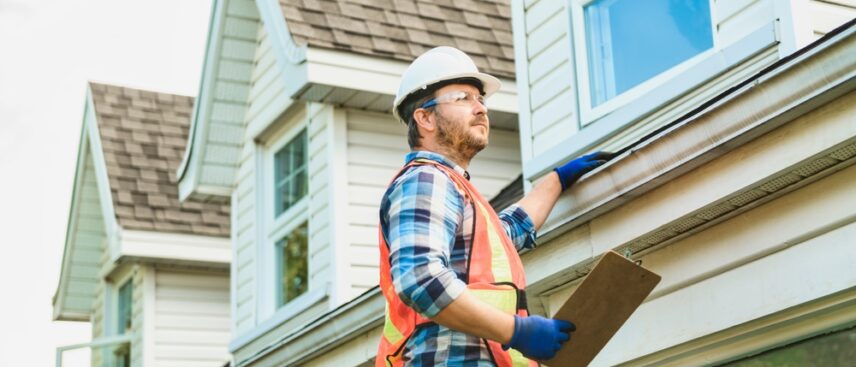As a homeowner, you should include regular roof inspections by a qualified roof inspector as an essential part of your home maintenance. Roof inspections save you money, contribute to the safety and value of your home, and reduce the chances that roofing problems disrupt your life.
Read on to learn more about roof inspections, important times to schedule a roof inspection, and how to select a qualified inspector for your roof.
Why Regular Roof Inspections Are Essential
Regular roof inspections lengthen your roof’s lifespan and contribute to your home’s safety and value. These inspections also help you discover minor problems early.
Discovering these problems early means less expensive, easier repairs. Left undiscovered and unrepaired, minor issues worsen. More serious roof problems result in water damage to walls, ceilings, and other parts of your home, requiring more extensive and expensive repairs that can disrupt family life. Serious damage may result in all or part of the roof and walls collapsing.
Having regular roof repairs completed removes worries about the condition of your roof. Documented inspection records serve to support insurance claims for roof repairs. They also ease the mind of a potential buyer should you decide to sell your home.
What a Comprehensive Roof Inspection Includes

You can see some damage to your roof yourself from the ground or by flying a drone over it. Broken, curled, cracked, or missing shingles and shingles visibly lifted by high winds stand out.
A professional roof inspector may climb up on your roof, use a drone to inspect it or use an infrared scanner to look for areas where heat is escaping. Whichever method they use, they have the training to notice issues you may miss or not know about.
In addition to weather damage and the conditions of shingles mentioned above, professional roof inspectors examine wood shingles for damage from insects like carpenter ants and termites and signs of rot or fungi and moss growing on wood shingles. They examine asbestos tiles for the loss of granules. If you have asbestos tiles, your inspector will check your gutters for signs of lost granules. They also check for shingles loosened by the wind that has not yet visibly lifted.
During a comprehensive roof inspection, the inspector checks to ensure that:
- Your gutters and downspouts are clear and working efficiently to remove water from your roof.
- Your attic ventilation system allows sufficient air circulation to prevent the buildup of heat and moisture in your attic.
- The flashing covering the joins between the main roof, the roofs of dormers, and the wings of the house and the flashing around projections above the roof, such as vent pipes and chimneys has not rusted or cracked.
- Your chimney caps and other masonry exhibit no cracks or other signs of damage.
- The fascia and soffits on the exterior of the roof are free of warping, rot, and cracks.
If you have an unfinished attic, your inspector can examine the joists, rafters, and the roof’s decking and sheathing for water stains, pest infestations, and mold.
When to Schedule a Roof Inspection
You should schedule a routine roof inspection at least once a year. However, scheduling a routine inspection twice annually—in the spring and the fall—aids in preventative roof maintenance. A fall roof inspection discovers issues that need repairing to protect your roof from winter weather. A spring roof inspection uncovers damage that occurred over the winter.
Some other occasions also call for a roof inspection. If a major storm brings high winds or hail to your area, schedule a roof inspection as soon as possible in case you discover you need to make an insurance claim for roof repairs.
Some insurance policies limit the time you have to make a claim. In other cases, if you delay making a claim, your insurance may attempt to attribute damage to wear and tear rather than the storm and depreciate your payment. For the same reason, you should schedule a roof inspection whenever you notice water stains, leaks, or visible damage to your roof.
If you are purchasing a home, ask the owner for documentation of regular inspections and maintenance. You should schedule a roof inspection if the owner doesn’t have these records. You may be able to get the homeowner to pay for that inspection. If you are trying to sell your home, scheduling a roof inspection gives you documentation of the roof’s condition to show to potential buyers. That documentation gives buyers confidence and gives you an edge over other sellers.
Cost of a Roof Inspection

Roof inspection cost ranges from $75 to $900 with a national average of $235. Homeguide.com lists the range for roof inspection costs as $100 to $400, with an additional $75 to $200 for a roof certification that provides an estimate of the roof’s lifespan.
According to Homeguide.com, a separate interior inspection of your attic that examines your home’s structure, ventilation system, and insulation costs between $200 and $500.
The cost of a roof inspection varies based on a few factors:
- Roof inspections for roofs over smaller homes cost less than inspections for roofs of larger homes.
- Simple or common roof designs, such as flat or gable roofs, fall in the lower range. Steeply pitched roofs, the very high roofs of multi-story homes, and roofs with more complex designs—a gambrel or mansard roof—fall into the higher range. Roofs with one or more dormers or wings over other parts of the house also fall into the higher range.
- The type of roofing materials you choose also affects the cost of a roof inspection. For example, the cost of inspecting a roof with clay or slate tiles is higher than the cost of inspecting a roof with asbestos tiles.
- Anything that increases the length of time needed to examine the roof, such as severe damage, increases the cost of the inspection.
- Finally, the type of inspection you request can add to or reduce the cost. A basic physical inspection of a simple gable roof over a small home costs significantly less than a drone inspection or an infrared scan.
You should get multiple quotes and compare services and prices from multiple qualified roofing inspectors before choosing the one you will hire.
Finding a Qualified Roof Inspector

A common way to find a roofing inspector today is to type “roofing inspectors near me” into your favorite search engine. That gets you a list of companies and all the information the company offers about itself.
To find out what others say about the company, you can look for reviews on sites like Yelp and research the company on the Better Business Bureau (BBB) website to learn about complaints filed against the company and how they were resolved.
If you would rather start with a shorter list of companies, you can ask family members, friends, neighbors, coworkers, and other acquaintances about the companies that they hired when they needed a roof inspection. When you start your search this way, you’ve already learned something about the company from someone you know.
If you hired a general contractor in the past whom you trust, you can also ask that person for a referral. A general contractor will have worked with multiple roof inspectors in your area and can recommend the ones who do good work. Write down the names of the companies and who gave you the referral.
To begin researching the company, search their website to find out their licenses and certified training. A Residential Roof Inspector Certification indicates training in how residential roofing systems, materials, and ventilation systems interact with the weather and what effect that will have on your home. A Wind Damage Inspector Certification indicates advanced training regarding how high winds and tornadoes affect a home and whether the damage can be repaired or whether the roof must be replaced.
The National Roof Inspection and Certification Association is the leader in the roofing industry, but each state also has its own licensing bodies. A real estate agent or a lawyer who specializes in real estate will know the requirements that your roofing inspector should follow.
With this knowledge about the company’s certifications and licenses, you will have more insights into the customer reviews you see and the information the company presents on its website. Read the more recent reviews and ratings, then narrow your list down to the three companies that perform the services you need efficiently at a price that is within your budget.
Schedule an interview with each of the three companies you’ve chosen.
You should ask your roof inspector:
- About the company’s years of experience in general and experience specifically with your type of roof and roofing material.
- If the company’s workers are all fully licensed and insured.
- What type of inspection does the company perform (physical, drone, infrared scan, attic inspection)?
- What the company looks for when performing an inspection.
- If your roof is damaged during the inspection or if there is an accident or a worker slips, does the company assume responsibility?
- How soon can the company do the inspection?
- How long will the inspection take?
- Will the company provide a detailed written report regarding the condition of the roof as they see it and any recommended repairs?
- Is there a chance of additional charges based on what the company finds?
- Does the company guarantee its inspection service?
- Confirm in writing that each of the three companies has the necessary certifications and licenses in your city and state to do the work.
If you are satisfied with the interview responses, ask the company for a quote on the roof inspection. Review the answers to your interview questions, the services offered, and the quotes on cost and time frame for the work you are given, and choose the company that best fulfills your needs.
